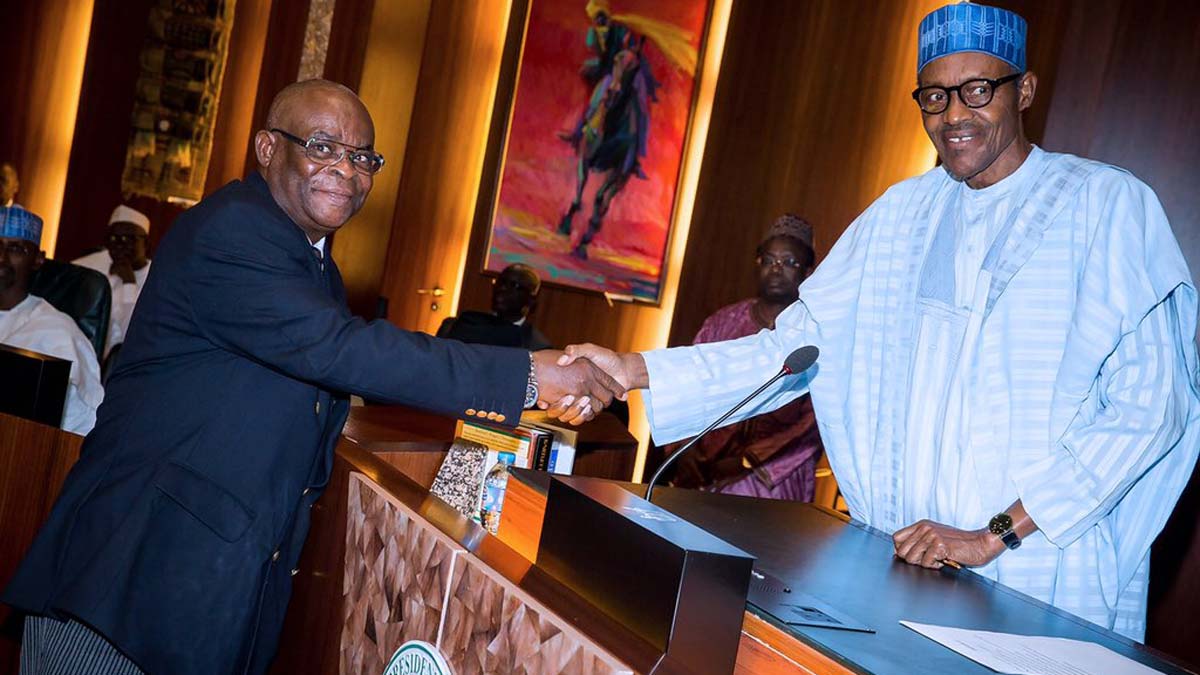There are no products in your shopping cart.
| 0 Items | £0.00 |

 NIGERIA'S embattled chief judge Justice Walter Onnoghen has dragged President Muhammadu Buhari to court challenging his suspension from office saying that it was done unlawfully and unconstitutionally.
NIGERIA'S embattled chief judge Justice Walter Onnoghen has dragged President Muhammadu Buhari to court challenging his suspension from office saying that it was done unlawfully and unconstitutionally.
Last Friday, President Muhammadu Buhari suspended Justice Walter Onnoghen and replaced him with Justice Tanko Mohammed, who was sworn-in as the acting chief judge of Nigeria (CJN). Over the last few weeks, Justice Onnoghen has been involved in intense political jockeying with the government that involved him being charged before the Code of Conduct Tribunal (CCT).
Justice Onnoghen challenged the jurisdiction of the CCT to try him and filed a motion to that effect and there are several other legal suits on the matter also pending. Despite the matter still being before the law courts, President Buhari decided to suspend Justice Onnoghen and replace him with the Bauchi State-born Justice Mohammed.
Now, the matter has taken a further twist as Justice Onnoghen has gone before the Abuja Division of the Court of Appeal to challenge the ex-parte order the CCT issued for his suspension. He argued that the CCT led by Justice Danladi Umar erred in law by granting an ex-parte order for his removal, even when its jurisdiction to entertain the six-count charge the federal government levelled against him was being challenged. He therefore applied for an order setting aside the order of the tribunal made on January 23, directing the appellant to step aside as the chief justice of Nigeria and a further order that the president takes all necessary measures to swear-in the most senior justice of the Supreme Court of Nigeria as acting chief justice and chairman of the National Judicial Council (NJC).
Justice Onnoghen contended that the exercise of powers over the motion ex-parte without first determining the jurisdiction of the tribunal amounted to unlawful exercise of jurisdiction and therefore void. He based his claim on the fact that a three-man panel of the Court of Appeal had on January 24, ordered the CCT to halt further proceedings before it to await the outcome of an appeal Justice Onnoghen lodged before it.
Meanwhile, the NJC has waded into the crisis, directing Justice Onnoghen, to respond to corruption allegations against him within seven working days. It also gave Justice Tanko Muhammad, the same number of days to explain why disciplinary action should not be taken against him for submitting himself to be sworn-in by President Muhammadu Buhari as Justice Onnoghen’s replacement.
Both judges now have until Thursday, February 7 to respond to the queries taken by the NJC at an emergency meeting it held in Abuja. A former president of the Nigerian Bar Association, Dr Olisa Agbakoba, had petitioned the NJC, asking it to determine the propriety of Justice Mohammed accepting to be sworn-in by the president in place of Justice Onnoghen despite being aware of the implication of his conduct.
According to Agbakoba, by submitting himself to the president to be sworn-in, Justice Mohammed lent himself to constitutional infraction by the executive arm of government. He recalled that Justice Muhammad was a member of the panel that sanctioned Justice Obisike Orji of Abia State for allowing himself to be sworn-in as Abia State chief judge by the state’s governor without recourse to the NJC.
In addition, the NJC has sent a petition against Justice Umar, the CCT chairman to the Federal Judicial Service Commission (FJSC). A group known as the Centre for Justice and Peace Initiative, had urged the NJC to sanction the CCT boss for engaging in the reckless abuse of his judicial powers but the NJC said the FJSC was the appropriate constitutional body empowered to deal with issues the petitioner raised.